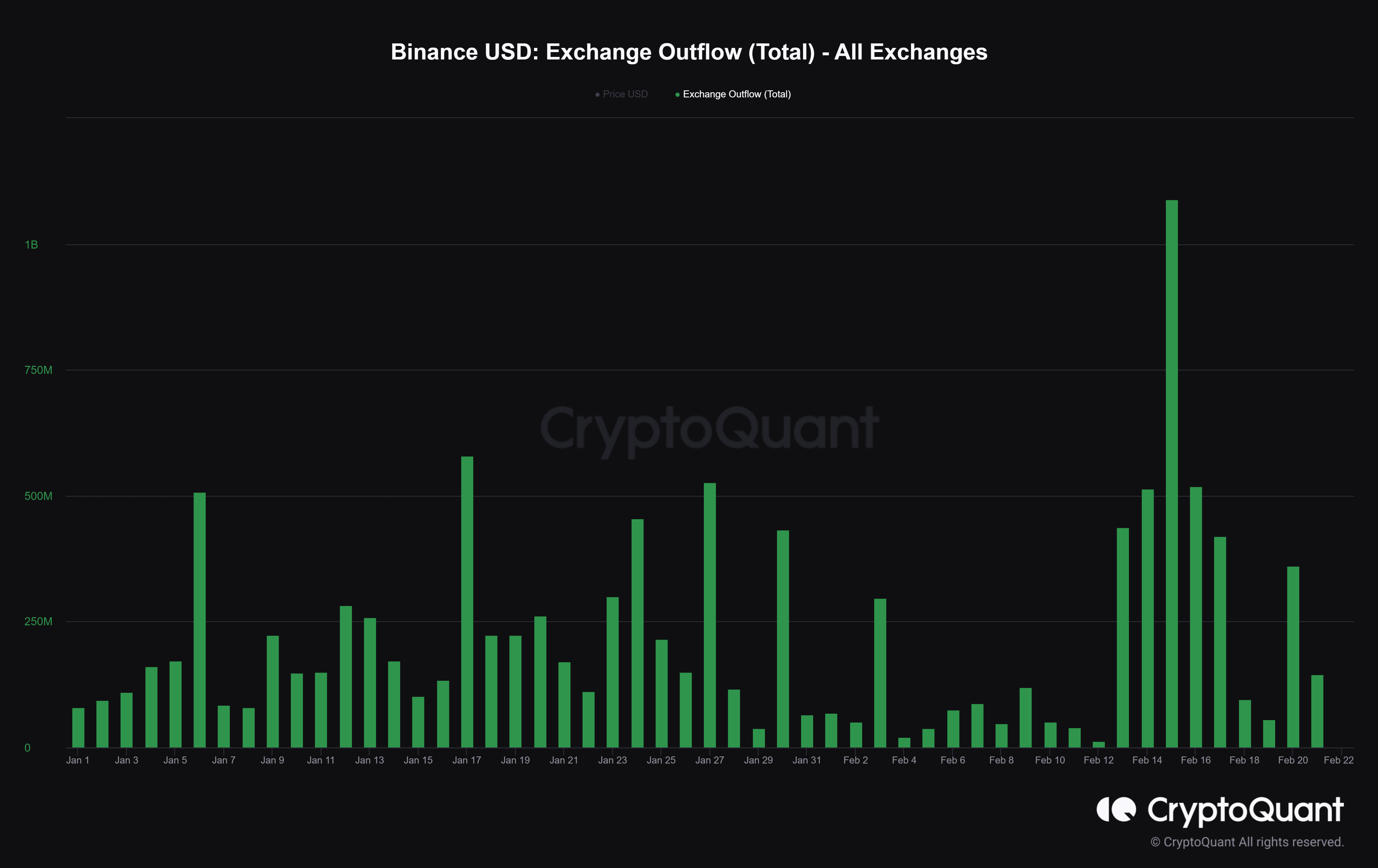Key Takeaways
- 17% of the BUSD supply has been pulled from exchanges in the last week
- BNB has been curiously resilient, above the level it was pre-announcement of the BUSD shutdown
- Regulatory trouble won’t stop anytime soon for Binance, which is already under investigation by the Departement of Justice for alegged anti-money laundering breaches
I remember arguing in the past that one of the best things that could happen crypto would be if the industry slowly waned itself off Tether.
Whatever your opinion of the controversial stablecoin or, more specifcially, the do-they-don’t-they question of its reserves, the conversation is damaging for crypto as a whole, so I wrote.
I did wonder how it would be possible, however. Could an entire industry just harmelesly migrate to other stablecoins, watching Tether’s market cap peacefully fade until it was no longer an enormous risk to the entire space?
But in a curious twist of fate, the industry is actually slowly waning itself off another stablecoin. That stablecoin is BUSD, which on February 13th was announced as allegedly being in violation of securities laws, the SEC coming for its New York-based issuer, Paxos (I crafted a deep dive on what it all means here).
And it’s all going rather smoothly, at least outside the offices of Binance.
Balance of the BUSD exchanges on exchanges has fallen from $14.5 billion on the day of the announcement to $12.0 billion, a 17% wipeout in just over a week.
With Paxos forced to stop minting new BUSD tokens, the stablecoin will quite literally fade into the oblivion, dollar by dollar. “BUSD market cap will only decrease over time”, as the big man himself said.
3/ As a result, BUSD market cap will only decrease over time.
— CZ 🔶 Binance (@cz_binance) February 13, 2023
Paxos have confirmed that they will redeem BUSD at least until February 2024, while Binance have announced they will reduce trading pairs offered for the coin. Investors are already queuing for the exit, as seen by the above balance on exchanges.
However, it hasn’t been overly dramatic. The below chart from CryptoQuant shows a definite uptick in outflows around February 13th/14th in the immediate aftermath of the announcement, yet beyond that the chart doesn’t seem overly out of whack.

All in all, this seems to show BUSD exiting stage left in rather a rather subdued manner. Hey, it’s good to get a little calm in crypto for once, I suppose.
Massive blow for Binance
So, panic seemingly over – for the market, at least. There is no getting around the fact that this development is a substantial blow to Binance’s business. It had designs on dominating the market, even more so that it already does.
I wrote a deep dive into the stablecoin war last October, a war which Binance was beginning to make ground in. It announced the anit-competitive, albeit brilliant move business-wise, to delist a selection of other stablecoins, including USDC, for favour of its BUSD coin. It also autoconverted customer holdings into the latter.
The landscape was starting to looking even rosier for the biggest crypto company on the planet.
But the SEC blew up the party last week, reversing all Binance’s progress. A crucial method to their growth going forward, the loss of their native stablecoin is a colossal blow.
This is why I find it surprising to look at the price action of BNB, the native token of the Binance platform. It has held up remarkably well, trading at around $310 pre-announcement before dropping to $284, only to bounce back to where it now trades at $312, more or less the same level it was before this storm.
BNB is more valuable the more valuable Binance is, as the token has no real use case beyond the platform, where it used by customers for all sorts of features, primarily lower fees. I would have expected it to shrink somewhat in the aftermath of this news.
It doesn’t exactly settle my stomach on the topic of native tokens. I have been critical of these in the past and will continue to do so going forward – there is no reason for these companies to create a cryptocurrency and whack it on the blockchain.
The tokens commonly come with huge insider allocations, elastic supply mechanisms and, as is typical with all things in crypto today, cloaked in secrecy – the lack of transparency is a real concern. But that is not overly relevant for this piece, I suppose.
When I look at BNB not moving downward, I struggle to explain why it hasn’t moved down. I think it would be natural to do so, given the haymaker taken by its parent company. Then again, plotting the token against Bitcoin since throughout the bear market shows it has actually outperformed the world’s king crypto – something alt coins are not meant to do.
A testament to Binance’s immense growth, but also a curiosity that the bear market has not been harsher.
Final thoughts
Ultimately, BUSD appears to be winding peacefully to a close. At least, for now it does, but never rule out anything in crypto.
Perhaps the price action of Binance’s native token, BNB, is the more surprising footnote to this. Things can change quickly in crypto, but for now, it definitely seems surprising that token has been so resilient.
Who knows what happens next in the regulatory space? Binance is already being investigated by the Department of Justice in a case running from 2018, related to anti-money laungering laws and sanctions. The SEC throwing the book at BUSD is just the latest regualtory sour note to plague the exchange. It would seem ambitious to believe it is the last.
After a year which saw investors crushed by scandals ranging from Luna to FTX, regulation is coming in hard. It’s not going to stop anytime soon.
The post 17% of BUSD supply redeemed this week. What next for Binance, BNB and crypto? appeared first on CoinJournal.


